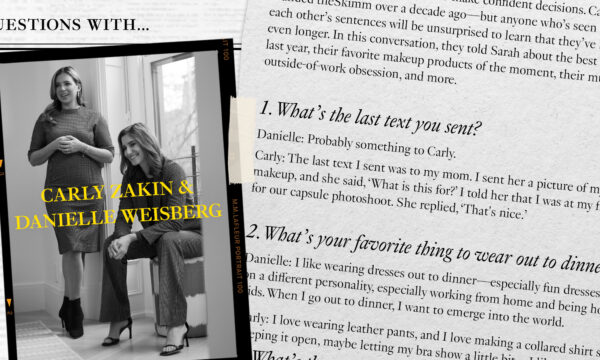
Shop This Look
How Do You Know When It’s Time to Leave a Toxic Job?
According to these five women, the sooner you get out, the better.
While every job has its downsides, some workplaces are downright toxic. All too often, workers are forced to deal with companies that don’t treat their employees fairly and cause them such anxiety that they wonder why they ever signed on in the first place.
In these situations, it can be difficult to find the courage to stand up for yourself and head for the exit. But everyone deserves a healthy work environment. If you find yourself in a toxic job, remember that, as hard as it may seem, you can leave—take it from five women who did just that.
Want more M Dash?
Sign up for our weekly newsletter.
Thank you!
Brie, 26, Toronto
“Fed Up with Being Burned Out”
“As a journalist, I was always burned out, working overtime and weekends while my bosses only looked out for themselves. When I did get days off, I didn’t have the energy for a social life, which made me anxious and depressed.
In July 2021, I got food poisoning. When I called in sick, my employers told me that I should’ve come in anyway. Then, in early 2022, I was told I wasn’t allowed to take more than two vacation days in a row. I had to beg for a Thursday off to attend a family event.
Many employees left throughout those months, and my company didn’t replace them. It was expected that the rest of us would pick up the slack.
When I told my bosses I was getting burned out, they said, ‘We gave you that weekend in May off. What more do you want?’ I didn’t get another weekend off until I quit in July.
I wish I’d left sooner. At my new company, everyone cares about each other. I did pick up some bad habits from my old job surrounding work-life balance: I still feel like I need to barter for days off, and I feel guilty taking sick days and long vacations. But I know they’re what I’m entitled to.
Never put your job over your mental health, no matter how ‘good’ it is. There are always other jobs out there.”
“Never put your job over your mental health, no matter how ‘good’ it is. There are always other jobs out there.”
Ashley, 35, New York
“Tired of Putting Profit Over People”
“When I started as lead photographer at a major clothing company, I was excited to affect positive change in my industry. Yet, when the pandemic hit, things soured. I spent the entire time working in person, even though I wasn’t an essential worker. I put my health at risk so the company could make a profit.
Additionally, the CMO said that we shouldn’t create plus-size clothing, because it’s not ‘aspirational.’ In other meetings, she’d discourage me from shooting campaigns, saying we should work with ‘bigger photographers.’ I shared these issues with HR. Their response? ‘If you ever become a CMO, you can do things differently.’
Later, the company moved my team to another city with very little notice. In order to keep our jobs, we’d have to accept demotions and lower salaries. That was enough—I decided to leave.
I worried that I would never work again, and that I wasn’t worthy of a fruitful career. Even a year after I left, I had trauma symptoms stemming from how I was treated. Looking back, I’ve learned that we should all speak up when we realize we’re working in a toxic environment.”
Caryn, 37, New York
“Done Getting Walked All Over”
“From 2018–2022, I was an executive assistant in consulting. At first, it was great. But things started to get bad right before the pandemic. I had become the highest performer on my team, but management didn’t acknowledge it. Then, the other assistants began leaving, and their work was reallocated to me.
When I asked to be considered for positions on other teams, they said I was missing specific qualifications. And yet, they would hire individuals without specialized degrees or skills who left within months.
The environment was very political; it only mattered whose ear you had. I found myself doubting every interaction, wondering what others’ agendas were. I would go outside to cry at least twice a week. I had panic attacks and would break out into hives.
At one point, I was accused of behavior that didn’t match the firm’s policies. I asked for examples, and they said, ‘It’s a vibe people are getting on the floor.’ I was insulted that they would accuse me without any proof. I felt like I was being punished for trying to take care of myself.
I left about six months later. The partners were devastated; they even called a meeting with HR to demand answers, and the firm all but said, ‘If we knew she was going to quit, we wouldn’t have done it.’ They thought it was okay to treat me poorly and that I would just take it, which hurt more than the accusations.
I’m proud that I stood up for myself, but I wish I had set better boundaries sooner. I’ve learned that everyone is replaceable, no matter how good you are or how hard you work.”
“I’m proud that I stood up for myself, but I wish I had set better boundaries sooner. I’ve learned that everyone is replaceable, no matter how good you are or how hard you work.”
Jessica, 29, Los Angeles
“Scared of a Tyrannical Boss”
“Four years ago, I was a coordinator at a London-based film production company. The agreement was that I’d work for the summer to start, with the possibility for more involvement after. They gave me zero benefits and paid me atrociously, but I felt I had to ‘pay my dues,’ because it’s such a competitive industry.
Whenever the producer I worked for called or visited LA, it was hell. He treated me like his personal assistant, screaming at me often. I lived in constant fear of his outrageous demands and explosive reactions. Because of the eight-hour time difference between LA and London, I would wake up panicked. It was exhausting, physically and mentally.
Once, when my boss was in town, his screaming got so loud that the CEO of another company walked by and said, ‘You can’t speak to her like that.’ To have a third-party person point that out was eye-opening.
During my employee review, I was told that, despite doing a great job, they would not be offering me a pay increase. At that moment, I knew I was done. I left a month or so after.
Leaving felt incredible. I was so proud of myself for doing what was best for myself. Yet, the experience left me deeply resentful of male leadership.
I’m in a healthier place now, working with a very kind, male supervisor. But sometimes, I still get nervous about having the wrong answer, or automatically assume I did something wrong. It bothers me that I still react that way.”
“Leaving felt incredible. I was so proud of myself for doing what was best for myself. Yet, the experience left me deeply resentful of male leadership.”
Makena, 29, New York
“Exhausted Working Around-the-Clock”
“At the ad agency where I worked as a strategist, we acted like a big happy family. But then, a person in leadership started making sexual comments and sending bizarre, non-work-related texts to young female employees after hours. They also bragged about their money to underpaid employees. It felt gross and wrong, but we didn’t think we had enough reason to speak up.
When we found out that the person was using inappropriate nicknames for employees behind our backs, we finally reported it to HR, but they did nothing, because they reported to this person. People started leaving, and the company let it happen—seemingly in an effort to clear out anyone who had knowledge of the incident. I had no department head for about a year, my boss left, and they fired the only other person on my team. I was 24 and running an entire department alone in a company of 50 people.
And then, after I’d been working on a big pitch around the clock for a month, my company abruptly took me off the project. I tried getting involved in other projects, but the other departments shut me out.
I resigned after returning from a week of vacation. I learned that company culture comes from the top down; if there’s something toxic about the leadership, leave and commit your time and talent to someone who deserves it.”










